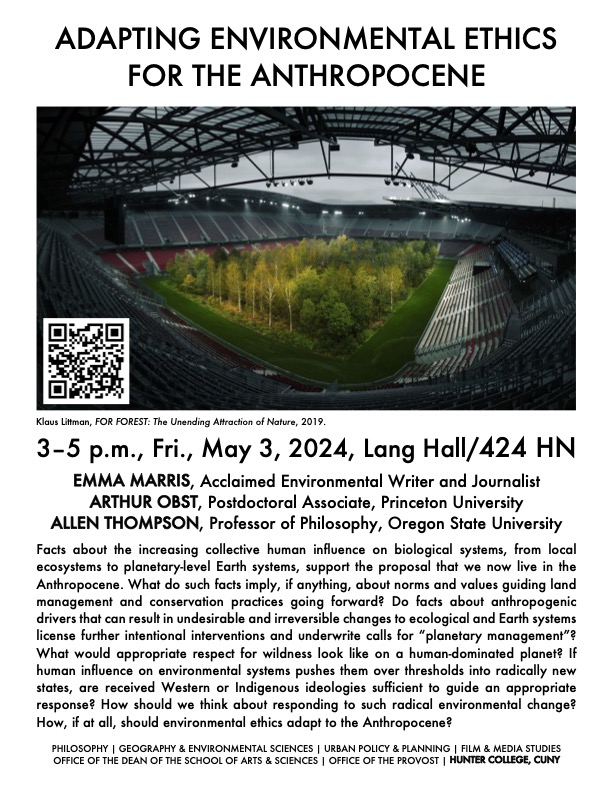A Night of Philosophy & Ideas, at the main branch of the Brooklyn Public Library, is an all-night marathon of philosophical debate, performances, screenings, readings, music, and virtual reality experiences takes over the entirety of the iconic Central Library.
This year’s participants will consider humanity’s relationship to the world, to nature, to other living beings and species, and to technology. They will ask: What is the meaning of life? How do we live our lives from beginning to end, be it striving or barely surviving? How do we define that experience and how do we situate ourselves in this world?
French-American economist Esther Duflo, winner of the 2019 Nobel Prize in Economics, will kick off the evening with a keynote address. The lineup also features a French anthropologist, sociologist, and physician Didier Fassin, professor at the Institute for Advanced Studies and Director of Studies at the École des Hautes Études en Sciences Sociales; Catherine Malabou, Professor of Philosophy at Kingston University (UK) and UCI; Maïa Mazaurette, a Brooklyn-based French author, columnist, and illustrator whose work deals with contemporary sexuality and the body’s place in society; and Barbara Stiegler, professor of philosophy at the University of Bordeaux Montaigne and a member of the Institut Universitaire de France.
Performances will include Unnamed, from Jérôme Thomas, a French juggler whose work integrates contemporary dance and theatre, and Armenian-Syrian artist Hratch Arbach’s MAWTINI: lost homelands, in a site-specific installation. The event will also feature a late-night screening of Jacques Rivette’s landmark 1971 film Out 1, and an exhibition of work by New York-based visual artist Mary Mattingly, whose “sculptural ecosystems” in urban spaces include Swale and Pull, and who founded the Waterpod Project (2009), a barge-based public space and self-sufficient habitat that hosted over 200,000 visitors in New York.
A recent spate of critical engagements with Giorgio Agamben’s construction of the zōē, /bios distinction calls for renewed evaluation of the political valence of zōē in Aristotle’s political theory. While there may be ways of responding to these criticisms from within Agamben’s work, I am more interested in proposing an alternative account of zōē, one that better accommodates the breadth of Aristotle’s thinking about living beings, the context of ancient Greek conceptions of life, and a genealogical task that could be of service to a variety of strands of contemporary critical theory. Taking Aristotle’s treatment of zōē as an object of desire as my point of origin, I locate this orientation toward life within a broader conception of power as generativity and an alienated approach to the material conditions of human birth. I then trace the model of politics, zōē-politics, that arises from this framework.
Bio:
Sara Brill is Professor and Chair of Philosophy at Fairfield University. She works on the psychology, politics, and zoology of Plato and Aristotle as well as contemporary feminist and political theory. She is the author of Plato on the Limits of Human Life (Indiana 2013), Aristotle on the Concept of Shared Life (forthcoming from Oxford University press in May 2020), co-editor of Antiquities beyond Humanism (Oxford 2019), and has published numerous articles on Plato, Aristotle, Greek tragedy, and the Hippocratic corpus.
Facts about the increasing collective human influence on biological systems, from local ecosystems to planetary-level Earth systems, support the proposal that we now live in the Anthropocene. What do such facts imply, if anything, about norms and values guiding land management and conservation practices going forward? Do facts about anthropogenic drivers that can result in undesirable and irreversible changes to ecological and Earth systems license further intentional interventions and underwrite calls for “planetary management”? What would appropriate respect for wildness look like on a human-dominated planet? If human influence on environmental systems pushes them over thresholds into radically new states, are received Western or Indigenous ideologies sufficient to guide an appropriate response? How should we think about responding to such radical environmental change? How, if at all, should environmental ethics adapt to the Anthropocene?
